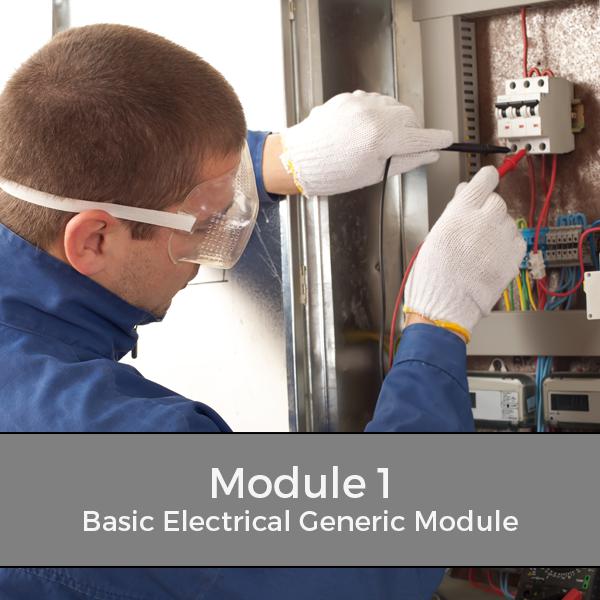Basic Electrical Generic Module – Module 1
Basic Electrical Generic Module: Course Description
The main objective of the Basic Electrical Generic Module is to give you the foundation knowledge and electrical ‘vision’ to fundamentally understand how and why an electrical system works and allow you to develop with confidence and competence.
Day 1 of the Basic Electrical Generic Module course
Fundamentals of electricity:
- Electron theory including atomic elements and free electrons
- Charge and attraction
- Coulomb’s Law
- Conductors, Insulators and Semiconductors
- Current
- Voltage
- Resistance
- Electrical symbols and mathematical prefixes.
Day 2 of the Basic Electrical Generic Module course
Simple electrical circuit theory:
- Ohm’s Law
- Using digital multimeters to measure resistance, voltage and current
- Practical workshop including the building a simple electrical circuits calculating the expected value of current and measuring the actual resistance, voltage and current
- DC series circuits, this follows the theory then practical route
- DC parallel circuits, again this follows the theory then practical route reinforcing the use of previously learnt techniques.
Day 3 of the Basic Electrical Generic Module course
- DC series – parallel circuits, following the same pattern as the previous day
- Power, solving power problems using power formulae
- Magnetism
- Electromagnetism and electromagnets.
Day 4 of the Basic Electrical Generic Module course
- Introduction to AC, sine waves, single and 3 phase supplies
- AC generation
- Frequency
- Voltage and current, peak, instantaneous and RMS values
- Relationship between line and phase voltage in a 3 phase system
- Transformer theory, calculation and practical.
Day 5 of the Basic Electrical Generic Module course
- Capacitance theory, calculation and practical
- Inductance theory, calculation and practical
- Impedance theory, and calculation of circuit impedance.
Course Overview
Receive the full course overview by submitting your details below

Essential Book supplied *throughout* course!
First exam fee included!
Locations
Chesterfield
On-site
The Tutors:
Our Tutors are qualified, highly experienced, enthusiastic, knowledgeable and extremely friendly, you can take full advantage of all the tips of the trade, personal experiences and practical advice they offer. This short theory course is intensive, but no compromise is made on the course content. The atmosphere is relaxed and enjoyable which creates a good learning environment.
Course Reviews
BOOK YOUR COURSE BELOW
£625.00 + VAT (£750.00 inc VAT & all fees)
Now comes with our brand new, extra accreditation at no extra cost!
City & Guilds – Fundamental Foundations Electrical Principles & Practices
Course Duration:
Pre-Requisites
None
Choose Course Location First:
-
20May 2024




